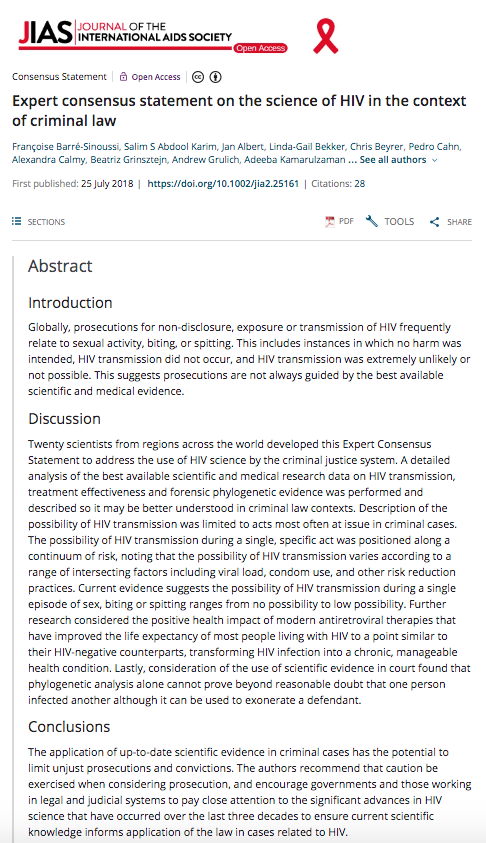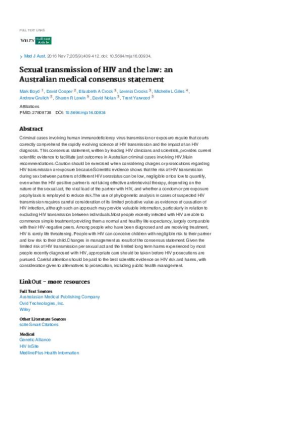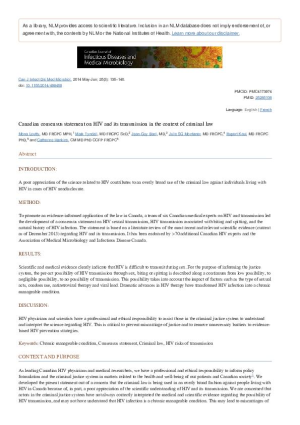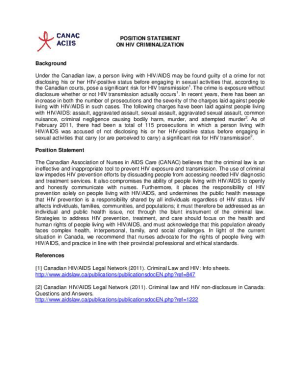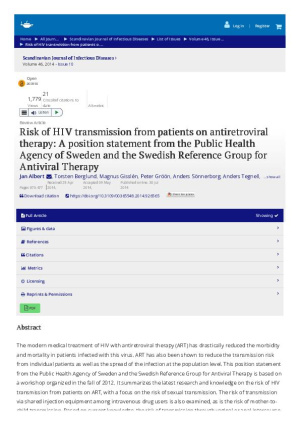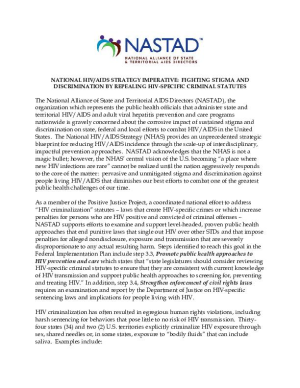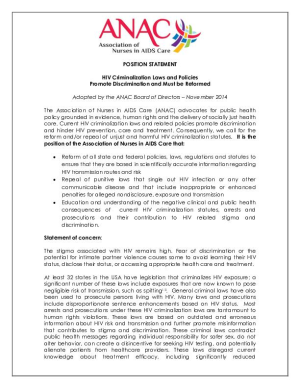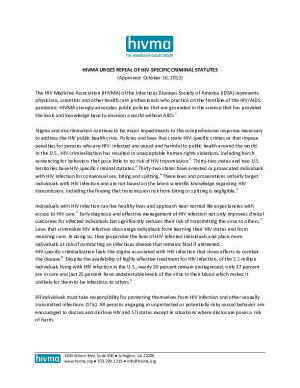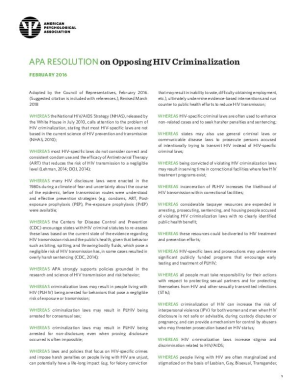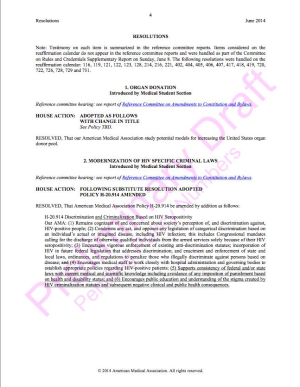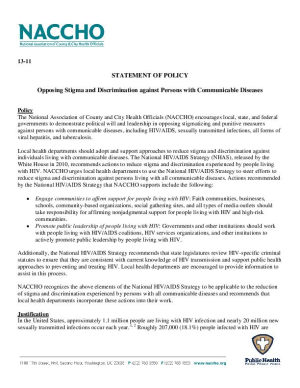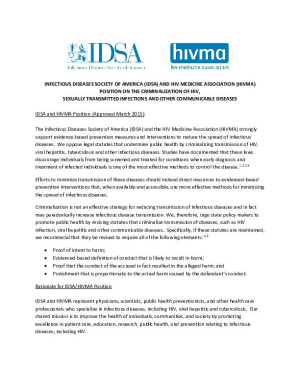Review of existing studies to show that a person with HIV who has no other sexually transmissible infection, has adhered to antiretroviral therapy (ART) for at least 6 months to achieve completely suppressed viremia, and is monitored by an attending physician cannot pass on the virus through sexual contact.
Scientific evidence in a legal context
Statement by scientific and medical experts
Expert consensus statement on the science of HIV in the context of criminal law
Twenty scientists from regions across the world developed this Expert Consensus Statement to address the use of HIV science by the criminal justice system. Description of the possibility of HIV transmission was limited to acts most often at issue in criminal cases. The authors recommend that caution be exercised when considering prosecution, and encourage governments and those working in legal and judicial systems to pay close attention to the significant advances in HIV science that have occurred over the last three decades to ensure current scientific knowledge informs application of the law in cases related to HIV.
- Alternative links
- Czech: Expertní prohlášení k vědeckým poznatkům o HIV v kontextu trestního práva , French: Déclaration de consensus d'experts sur la connaissance scientifique relative au VIH dans le contexte du droit pénal, German: Expertenkonsens zur HIV-Wissenschaft im Kontext des Strafrechts, Mandarin: 專家共識聲明:刑法脈絡下的愛滋相關科學, Russian: Заявление об экспертном консенсусе в отношении научных данных о ВИЧ- инфекции в контексте уголовного права , Spanish: Declaración de Consenso de expertos sobre la ciencia relativa al VIH en el contexto del derecho penal
The Expert Consensus Statement on the Science of HIV in the Context of Criminal Law – Five-year Impact Report: Bringing Science to Justice
In 2018, twenty leading HIV scientists published the ‘Expert Consensus Statement on the Science of HIV in the Context of Criminal Law’ (Expert Consensus Statement) to address the misuse of HIV science in punitive laws and prosecutions against people living with HIV for acts related to sexual activity, biting or spitting. The process involved undertaking detailed analysis of the best available scientific and medical research data on HIV transmission, treatment effectiveness and forensics. Building on an initial scoping report published in 2020, the HIV Justice Network (HJN) undertook further research between April and July 2023 examining the impact of the Expert Consensus Statement in cases and advocacy in the five years since its publication.
Infant Feeding for Persons Living With and at Risk for HIV in the United States: Clinical Report
The AAP recommends that for people with HIV in the United States, replacement feeding (with formula or certified, banked donor human milk) is the only option that is 100% certain to prevent postnatal transmission of HIV. However, pediatric health care professionals should be prepared to provide infant feeding counseling and a family-centered, culturally sensitive, harm reduction approach for people with HIV on ART with sustained viral suppression who desire to breastfeed.
Sexual transmission of HIV and the law: an Australian medical consensus statement
Provides current scientific evidence to facilitate just outcomes in Australian criminal cases involving HIV. Argues that careful attention should be paid to the best scientific evidence on HIV risk and harms, with consideration of alternatives to prosecution, including public health management. Authored by leading Australian HIV clinicians and scientists.
Canadian Consensus Statement on HIV and its transmission in the context of the criminal law
Sets out in clear, concise, and understandable terms a collective expert opinion about HIV sexual transmission, transmission associated with biting and spitting, and HIV as a chronic manageable condition. Authored by six distinguished Canadian HIV clinicians and scientists.
- Alternative links
- French
Position Statement on HIV Criminalization
States that criminal law is an ineffective and inappropriate tool to prevent HIV exposure and transmission because it dissuades people from accessing diagnostic and treatment services and compromises open and honest communication with nurses. Recommends that nurses advocate for the rights of people living with HIV/AIDS.
Risk of HIV transmission from patients on antiretroviral therapy: a position statement from the Public Health Agency of Sweden and the Swedish Reference Group for Antiviral Therapy
Summarises the latest research on the risk of HIV transmission from people on suppressive treatment, focusing on risk of sexual transmission. Authored by the Public Health Agency of Sweden and the Swedish Reference Group for Antiviral Therapy.
Position statement on the use of antiretroviral therapy to reduce HIV transmission
Summarises extensive discussion about various aspects of current scientific data to explain HIV transmission risk.
National HIV/AIDS Strategy Imperative: Fighting Stigma and Discrimination by Repealing HIV-Specific Criminal Statutes
States HIV criminalisation undermines HIV prevention and sexual health messages, and breeds ignorance, fear and discrimination against people living with HIV. Argues that instead of applying criminal law to HIV transmission, governments should expand programs to reduce HIV transmission while protecting the human rights of people living with HIV.
HIV Criminalization Laws and Policies Promote Discrimination and Must Be Reformed
States HIV criminalization laws and policies promote discrimination and hinder HIV prevention, care and treatment. Calls for law reform and education.
HIVMA Urges Repeal of HIV-Specific Criminal Statutes
Highlights the detrimental effects of HIV-specific criminalization and supprts modernization of laws and practices to reflect current science and knowledge about HIV, the promotion of education addressing stigma associated with HIV-specific criminalization, and a federal review of federal and state laws, policies and regulations.
Policy Position Statement on HIV Criminalization
Opposes laws that distinguish HIV from other comparable diseases or that create disproportionate penalties for disclosure, exposure or transmission of HIV disease beyond normal public health ordinances. Supports non-punitive prevention approaches to HIV centred on current scientific understanding and evidence based research.
Resolution Opposing HIV Criminalization
Outlines APA’s opposition to HIV criminalization, and makes a number of recommendations including law reform.
AMA Resolution on Modernization of HIV Specific Criminal Laws
Resolution by the American Medical Association (AMA) including condemnation of HIV-based discrimination, calls for laws to be consistent with current scientific knowledge, and encouragement of public education about stigma created by HIV criminalization status and their negative consequences. (Background information provided by the Centre for HIV Law and Policy)
.
Statement of Policy: Opposing Stigma and Discrimination Against Persons with Communicable Diseases
Notes disease-specific laws and policies resulting in prosecutions fuel stigma and discrimination. Encourages local health departments to assist state governments to review HIV-specific criminal statutes to ensure that they are consistent with current knowledge of HIV transmission and support public health approaches to prevention and treatment.
Position on the Criminalization of HIV, Sexually Transmitted Infections and Other Communicable Diseases
Highlights the detrimental effects of criminalization statutes and offers a statement of support for evidence-based prevention measures and interventions to reduce the spread of infectious diseases.


